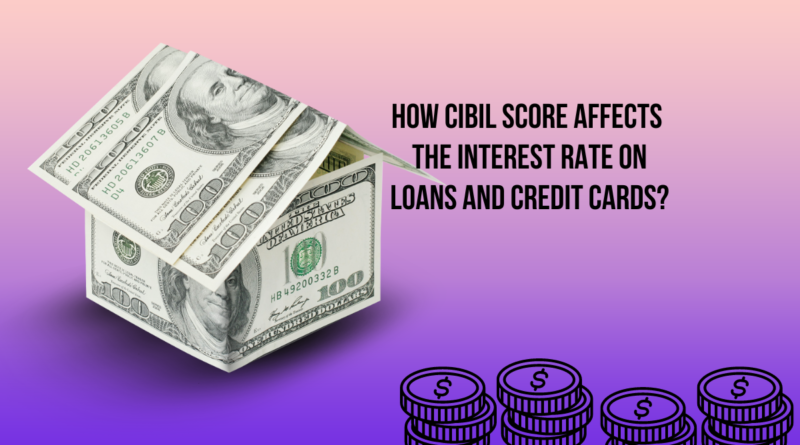How CIBIL score affects the interest rate on loans and credit cards?
A credit score is a numerical expression that determines an individual’s creditworthiness. It is calculated based on a person’s credit history and repayment behaviour. Credit scores play a crucial role in determining whether a lender approves an individual’s loan or credit card application. The Credit Information Bureau (India) Limited (CIBIL) is India’s first credit information company, and it maintains a database of credit-related information of individuals and companies. CIBIL scores are used by lenders to determine an individual’s creditworthiness. In this blog, we will discuss how CIBIL score affects the interest rate on loans and credit cards.
What is a CIBIL Score?
A CIBIL score is a three-digit number ranging from 300 to 900. The higher the score, the better the creditworthiness of the individual. A score of 750 or above is considered a good score and increases the chances of loan approval. The CIBIL score is calculated based on an individual’s credit history, which includes credit card usage, loan repayment history, and outstanding debts. Late payments, defaulting on loans, and high credit utilization can negatively impact an individual’s CIBIL score.
How CIBIL Score Affects Interest Rates on Loans Interest rates on loans
It is determined based on the creditworthiness of an individual. Lenders use an individual’s CIBIL score to determine the interest rate on loans. A higher CIBIL score indicates a lower risk of default, and hence lenders offer lower interest rates to individuals with high scores. Individuals with low CIBIL scores are considered high-risk borrowers, and lenders charge them a higher interest rate to compensate for the higher risk.
For example, if an individual with a CIBIL score of 800 applies for a home loan, the lender may offer an interest rate of 6%. On the other hand, if an individual with a CIBIL score of 600 applies for the same home loan, the lender may offer an interest rate of 10%. The interest rate difference is due to the difference in creditworthiness between the two individuals.
How CIBIL Score Affects Interest Rates on Credit Cards Credit card interest rates are also determined based on an individual’s creditworthiness. Individuals with higher CIBIL scores are offered lower interest rates, while individuals with lower CIBIL scores are charged higher interest rates.
Credit card interest rates are usually expressed as an Annual Percentage Rate (APR). The APR on credit cards can range from 10% to 40% depending on an individual’s creditworthiness. Individuals with high CIBIL scores are offered credit cards with lower APRs, while individuals with low CIBIL scores are offered credit cards with higher APRs.
For example, if an individual with a CIBIL score of 800 applies for a credit card, the lender may offer an APR of 12%. On the other hand, if an individual with a CIBIL score of 600 applies for the same credit card, the lender may offer an APR of 20%. The difference in APRs is due to the difference in creditworthiness between the two individuals.
Conclusion
In conclusion, CIBIL scores play a crucial role in determining the interest rates on loans and credit cards. Individuals with high CIBIL scores are offered lower interest rates, while individuals with low CIBIL scores are charged higher interest rates. Therefore, it is essential to maintain a good credit score by making timely payments and keeping credit utilization low. A good credit score not only increases the chances of loan approval but also helps in securing lower interest rates, which can result in significant savings over the loan or credit card tenure. Hope everything is clear to you regarding how CIBIL score affects the interest rate on loans and credit cards. Keep following Guest Blogging Pro to read the top-trending business blogs.




